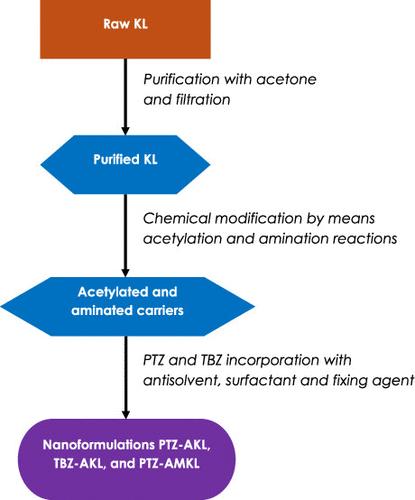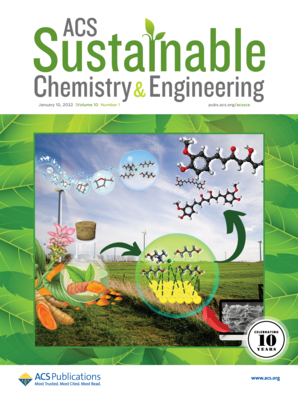Development and In-Field Validation of Fungicide Nanoformulations of Prothioconazole and Tebuconazole and Modified Kraft Lignin
IF 7.3
1区 化学
Q1 CHEMISTRY, MULTIDISCIPLINARY
引用次数: 0
Abstract
The search for alternatives to conventional agrochemicals presents itself as an excellent opportunity to develop sustainable, carbon-neutral agricultural technologies and to open new businesses. The use of kraft lignin, a renewable material with its chemical modification, is an opportunity to develop advanced and sustainable materials to reduce the negative impact of agrochemicals on the environment by reducing the active ingredient (AI) quantity for application. This work deals with the preparation, characterization, determination of incorporation efficiency (IE), and validation by in-field experiments of three fungicide nanoformulations using lignin-based carriers and prothioconazole (PTZ) and tebuconazole (TBZ) as AI at a mass ratio of 5 g of carrier: 600 mg of AI. The in-field experiments, associated with IE values from 83.2 to 100%, demonstrated the superior performances of the developed nanoformulations, against commercial formulations and isolated AI, to control Asian soybean rust and corn helminthosporiosis. In in-field experiments, the three formulations showed gains in productivity, highlighting PTZ-AMKL with 3030 kg ha–1 for soybean and PTZ-AKL 6438 kg ha–1 for corn, with productivity values above those obtained with commercial fungicide formulations─this behavior was observed also with the severity reduction in plants. Indeed, these new nanoformulations can reduce the quantities of both AI for pest control in order to reach sustainable agriculture by means of decreasing the negative effects from agricultural practices on the environment and public health.

原硫康唑、戊康唑及改性木质素纳米杀菌剂的研制与现场验证
寻找传统农用化学品的替代品本身就是发展可持续、碳中和农业技术和开辟新业务的绝佳机会。硫酸盐木质素是一种经过化学改性的可再生材料,它的使用为开发先进和可持续的材料提供了机会,通过减少应用的活性成分(AI)量来减少农用化学品对环境的负面影响。本文研究了以木质素为载体,以原硫康唑(PTZ)和戊康唑(TBZ)为AI的三种纳米杀菌剂的制备、表征、掺入效率(IE)测定和现场实验验证,其质量比为5 g载体:600 mg AI。田间试验结果表明,所研制的纳米配方对亚洲大豆锈病和玉米蠕虫孢子病的防治效果优于商品配方和分离AI, IE值为83.2 ~ 100%。在田间试验中,这三种配方均显示出生产力的提高,其中PTZ-AMKL大豆产量为3030 kg ha-1, PTZ-AKL玉米产量为6438 kg ha-1,其生产力值高于商业杀菌剂配方,这种行为也随着植株严重程度的降低而观察到。事实上,这些新的纳米配方可以减少用于虫害防治的人工智能的数量,以便通过减少农业做法对环境和公共卫生的负面影响来实现可持续农业。
本文章由计算机程序翻译,如有差异,请以英文原文为准。
求助全文
约1分钟内获得全文
求助全文
来源期刊

ACS Sustainable Chemistry & Engineering
CHEMISTRY, MULTIDISCIPLINARY-ENGINEERING, CHEMICAL
CiteScore
13.80
自引率
4.80%
发文量
1470
审稿时长
1.7 months
期刊介绍:
ACS Sustainable Chemistry & Engineering is a prestigious weekly peer-reviewed scientific journal published by the American Chemical Society. Dedicated to advancing the principles of green chemistry and green engineering, it covers a wide array of research topics including green chemistry, green engineering, biomass, alternative energy, and life cycle assessment.
The journal welcomes submissions in various formats, including Letters, Articles, Features, and Perspectives (Reviews), that address the challenges of sustainability in the chemical enterprise and contribute to the advancement of sustainable practices. Join us in shaping the future of sustainable chemistry and engineering.
 求助内容:
求助内容: 应助结果提醒方式:
应助结果提醒方式:


